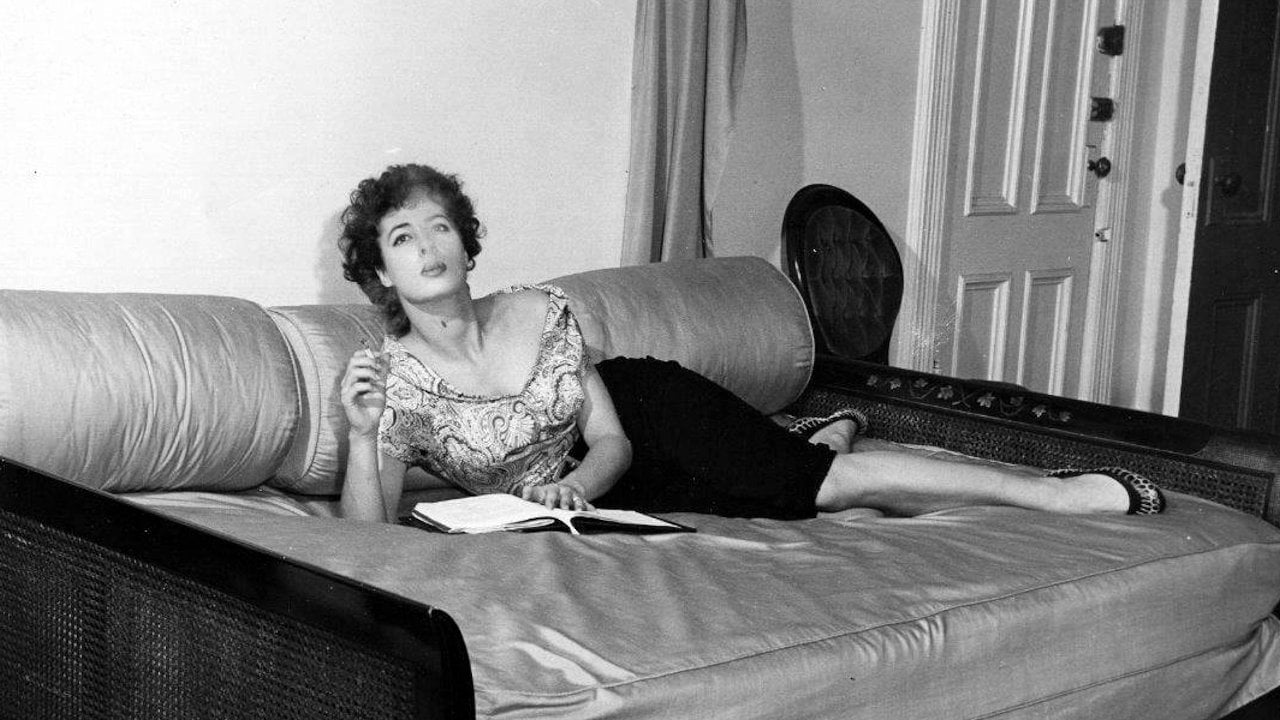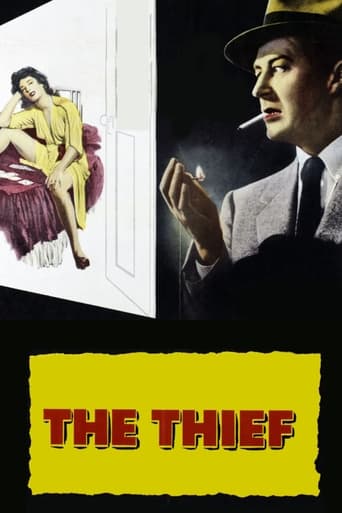Peereddi
I was totally surprised at how great this film.You could feel your paranoia rise as the film went on and as you gradually learned the details of the real situation.
Odelecol
Pretty good movie overall. First half was nothing special but it got better as it went along.
WillSushyMedia
This movie was so-so. It had it's moments, but wasn't the greatest.
Hattie
I didn’t really have many expectations going into the movie (good or bad), but I actually really enjoyed it. I really liked the characters and the banter between them.
TheLittleSongbird
While no classic, The Thief was quite an interesting little film. Although the story is on the hokey side with a plot line that is quite familiar in a way, and I think The Thief could have been shorter to make Allan Field's character's motivation clearer perhaps, the film does have its fair share of tense and suspenseful moments and has a clever little twist as well.What makes The Thief so interesting is that instead of dialogue, The Thief relies on its narration, sound effects, creation of ambiance and intelligence of the audience to convey its point. All of this is done in an intelligent way, with the narration well-written and clear and the sound effects well-judged with none of them feeling out of place to spoil the mood.The Thief is very well made. Its use of camera work and editing is quite innovative in the use of angles, while the lighting and scenery/sets are quite striking. The music is outstanding and appropriately moody, conveying the titular character's state of mind wonderfully and in a somewhat unnerving way, while Russell Rouse directs very well and makes interesting use of the film's gimmick, which on the whole I think does work. The acting is very good, even without dialogue the facial expressions, gestures and eye contact of Ray Milland in the lead and the likes of Martin Gabel, Harry Bronson and Rita Gam speak volumes.In conclusion, while not entirely succeeding at what it set out to do, The Thief is an altogether interesting little movie. 8/10 Bethany Cox
zsenorsock
If you can get through the first 15 minutes or so of this film, you're in for a real treat. Once the film gets going, its quite enjoyable, with scenes shot in Washington DC, Times Square, and most notably, the Empire State Building back when it was the tallest skyscraper in the world. The scenes on the 88th floor are beautifully shot, an then we get to travel higher to the 102nd floor and beyond. Anyone who loves New York will love this stuff. As a film, the gimmick of no dialogue works fairly well, though there are some scenes where it just doesn't seem natural that nobody would say anything (Milland's encounter with Gam at the flophouse screams for dialogue). But Milland carries it off for the most part and makes "The Thief" well worth a look.
F Gwynplaine MacIntyre
'The Thief' is a gimmick film, and the gimmick is more interesting than the film itself. Without the gimmick, this movie is a fairly banal Cold War drama. The central character is an American nuclear physicist (played by Ray Milland) who, at regular intervals, gives classified information to spies for a foreign power. (The enemy nation is never identified, but surely it's either the Soviet Union or a Soviet satellite nation acting as intermediary for the Kremlin.) Eventually the physicist's guilt and his latent patriotism overcome his other motivations, and he turns himself in.The gimmick is that this feature-length film tells its story without any dialogue. I've seen at least one reference book which lists 'The Thief' as a silent film. That's incorrect; 'The Thief' has a soundtrack, with conventional ambient sound throughout the film, and occasional human noises such as grunts and screams ... but no coherent dialogue.The gimmick is an interesting one, but it becomes wearying. On at least three occasions in this movie, Milland's character is home alone when his contact man rings him up. We see Milland staring in horror at the 'phone as it rings. And it rings. And it rings some more. Once we realise that there's never going to be any dialogue in this movie, we also realise that Milland isn't going to pick up the 'phone. It's not quite clear what's happening here. Is Milland allowing the 'phone to ring, unanswered, because the number of rings constitutes some sort of signal between Milland and his contact man? Or is Milland supposed to answer the 'phone, but he's too gutless to pick it up? Anyway, each time the ring-ring routine commences, it always ends the same way: eventually the scene fades out (with the 'phone still ringing), and then we fade in to Milland on his way to the next rendezvous. At several other points in the film, the narrative gets bent out of shape to enable the action to proceed without dialogue, in a situation where plausibility makes dialogue essential. (By the way, I *really* dislike any movie in which a 'phone keeps ringing or a baby keeps crying, and we're forced to listen to this because nobody on screen responds to the situation.)'The Thief' benefits from some extremely realistic locations, notably in one sequence in which Milland drops off his microfilm by sticking it in a drawer of a card catalogue in a reference library. Dozens of people are present, and none of them notice what he's doing. (Also, the hushed atmosphere of the library makes the movie's no-dialogue gimmick - in this particular scene, at least - very plausible.) The contact man in this scene is played by Martin Gabel, an American actor who affected a crisp mid-Atlantic accent; it's interesting to see Gabel here in a role that doesn't rely on his distinctive speaking voice. There's also a suspenseful sequence in which Milland must climb an outdoor stairway to deal with a 'tail' who's been surveilling him.On the negative side of the ledger, we get that old atom-bomb cliché which has afflicted other movies better than this one, including 'Torn Curtain' and 'Pickup on South Street': namely, that a mathematical formula is somehow so powerful that spies will want to steal it. That's nonsense, that is. The atomic-bomb secrets which were bandied about by Rudolf Abel and Julius Rosenberg were specific engineering schematics of military ordnance. In 'The Thief', Milland is just peddling algebraic equations ... and we're expected to believe that these fiddly bits of maths can somehow change the balance of power.The basic implausibility of this film's premise, strained even farther by the no-talking gimmick, is made a lot more bearable by the documentary-style cinema-verite techniques used throughout. Not one shot in this film looks like a studio set-up. At one point, one of Milland's contacts (who has just picked up the latest microfilm) steps into a crossing and blunders into the path of an uncoming vehicle. A woman pedestrian sees this, and she reacts. Because of the no-dialogue gimmick, which makes this seem like a silent film with dubbed-in sound effects, I expected her to react silently. Impressively, she screams; the movie would have lost all remaining plausibility had she not done so.Ray Milland (a seriously underrated actor, despite his Oscar) gives a strong performance in a role which allows him only a very limited emotional range and no dialogue at all. 'The Thief' would have been much more plausible if it had skipped the no-dialogue gimmick and told this movie conventionally. But without the gimmick, this would be a much less interesting film: the gimmick is much more compelling than anything else that's on offer here. I'll rate 'The Thief' 6 points out of 10.
jlundstrom
Why haven't I heard of this movie before? Not a single word spoken, yet every detail of the mental torture that Ray Milland endures as a seemingly unwilling Soviet spy is conveyed by his features and demeanor. Film review books call it tame, pretentious, uninspired. I suspect those reviewers (this means you, Lenny Maltin) have never actually watched "The Thief."

